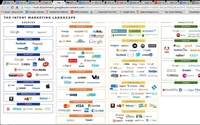
In the two decades
since Madison Avenue began dabbling in online marketing, it has used lots of words to describe what it was doing with it, starting with analogue media references like “publishing” and
“display” advertising, and then glomming on to the boom in paid and organic “search” marketing, and most recently a similar path into social media marketing (a.k.a.
“earned’). Now some agencies have begun utilizing a catch-all term to describe the consumer behavior underlying all of those forms of marketing -- intent -- and one them has even begun to
organize the digital playing field around it. Borrowing from LUMA Partners’ famous -- or -- infamous -- LUMAscape charts, MDC Partners’ KBS+ Ventures unit has compiled what it describes as
the “Marketing Intent Landscape,which runs the gamut from display through search and social, with a litany
of aftermarket platforms and services for buying, managing and optimizing the results of consumer intent.
advertisement
advertisement
“We all know that Intent driven marketing converts well, but most people
only name Google/search as the single intent source,” explains Darren Herman, president of KBS+ Ventures, the ad technology focused venture capital unit of MDC Partners, and Chief Digital
Officer of The Media Kitchen. “We have put together this document which outlines many sources and buying platforms to show agencies and marketers that there is plenty of intent outside of
search.”
In fact, conventional search engines like Google, Bing and Yahoo represent only one of five categories of intent-based marketing sources in KBS+’s landscape. The
others include social networks like Facebook and Twitter; display advertising on premium publishers like Yahoo, AOL, CBS and Meredith; location-based marketing through mobile platforms such as Apple,
Foursquare and Waze; transaction behavior via commerce sites like Amazon, eBay and Walmart; and video search and consumption via YouTube, Vimeo and Hulu.
But that’s just the
beginning of KBS+’s framework, the sources driving consumer intent. The landscape then migrates across silos covering “harvesters” (companies that mine data from consumer interaction
with those sources), “buying engines” (platforms enabling advertisers and agencies to target consumers based on that behavioral data), and finally, “analytics” (businesses
enabling marketers and agencies to glean insights and optimize the results of their intent-based marketing buys).
Herman says KBS+ created the landscape to better understand how
“intent travels across the Internet to marketers and publishers, noting that while Madison Avenue typically focuses on search, “Twitter is monetizing based on intent,” and so is
Amazon and the rest of the food chain.
To some extent, the landscape is also a road map for KBS+ own venture funding, and many of the start-ups on it are ventures it has a stake in,
including Adapt.ly, Awe.sm, CrosspiXelmedia, CrowdTwist, PlaceIQ, and Yieldbot. And at least one other one, trading desk Varick Media Management, is a sister company of KBS+, which Herman is also on
the board of.
While KBS+ portfolio is well represented on the landscape, Director Taylor Davidson says the real goal is to understand where the industry is heading in order to
capitalize on future game-changing investments.
“We only invest in areas where technology and data are disrupting advertising and marketing,” he explains, noting that
while most of those investments to date have focused on social, search of display, the thing they have in common is that they all “heavily leverage intent as the basis of their
models.”
In terms of where the biggest disruption may be coming from, Davidson says to pay close attention to the “emerging” group at the bottom of the landscape,
especially personal data platforms such as Fitbit, which enable consumers to start tracking and modeling their own intent. Davidson says KBS+ isn’t sure exactly how that will play out, but that
it will be highly disruptive and could significantly impact the way brands market themselves to consumers.
“The idea of utilizing data in advertising isn’t really new,” he says,
adding, “There has always been data in advertising and content. And the idea that intent-based marketing is new isn’t true either. What is new and different is that we are entering an area
where things are being much more easily shared by people, and we have the opportunity to communicate with them based on what they are sharing. The big change is in the total level of personal
information that is being shared.”